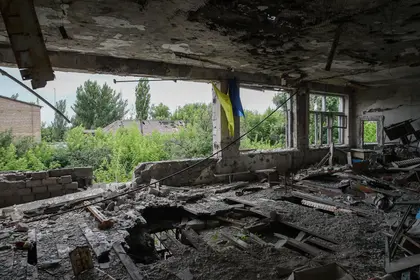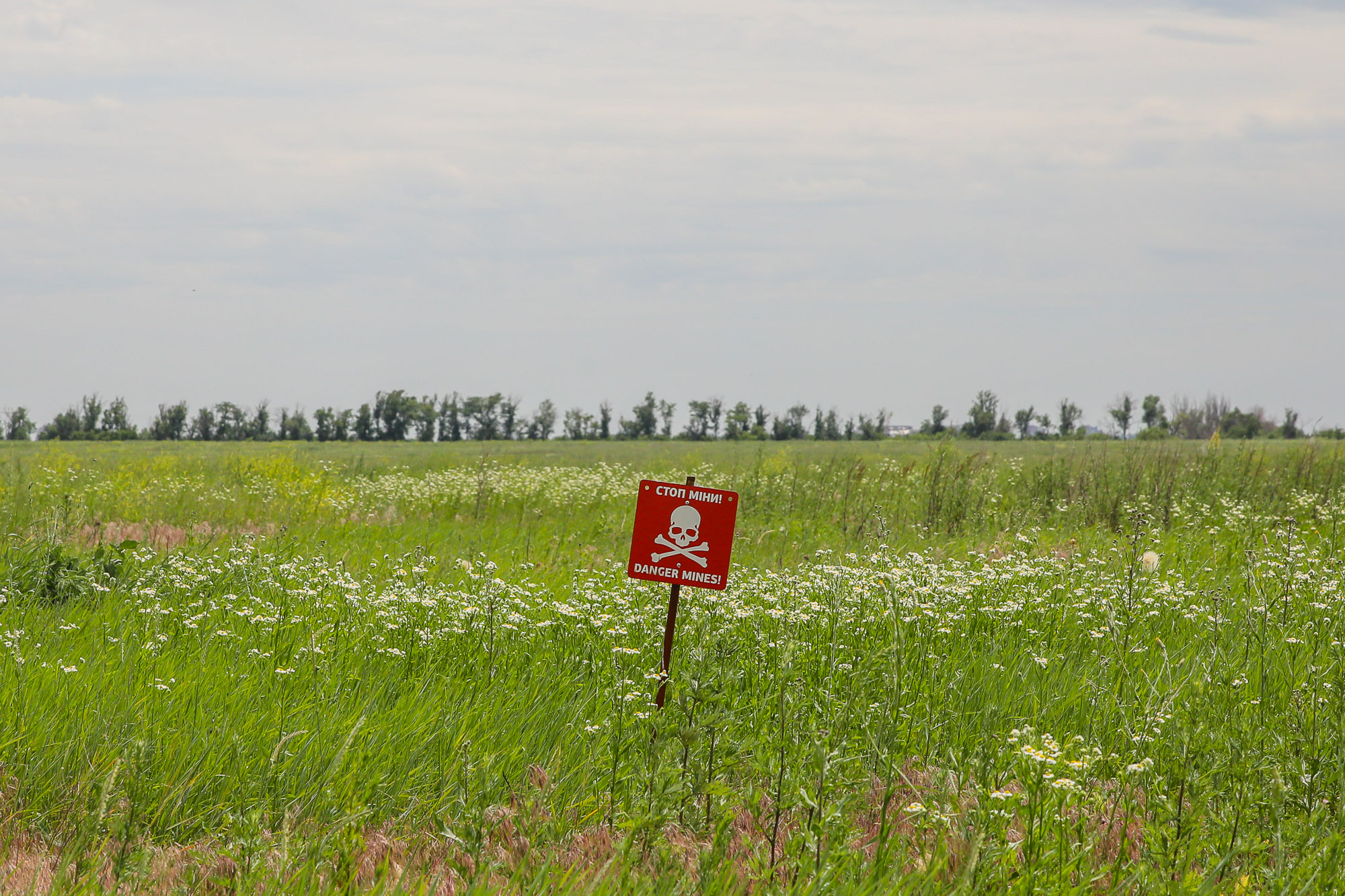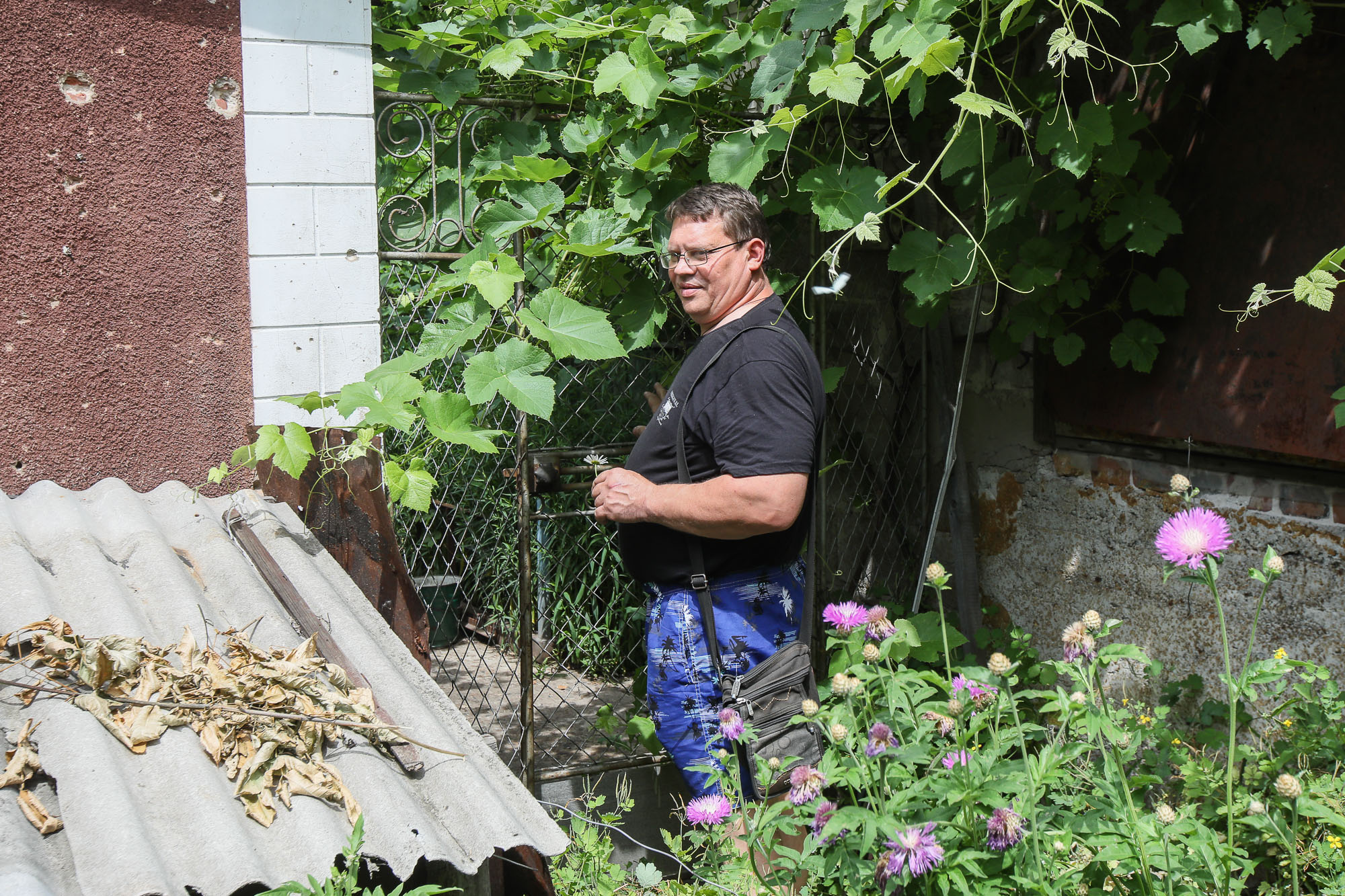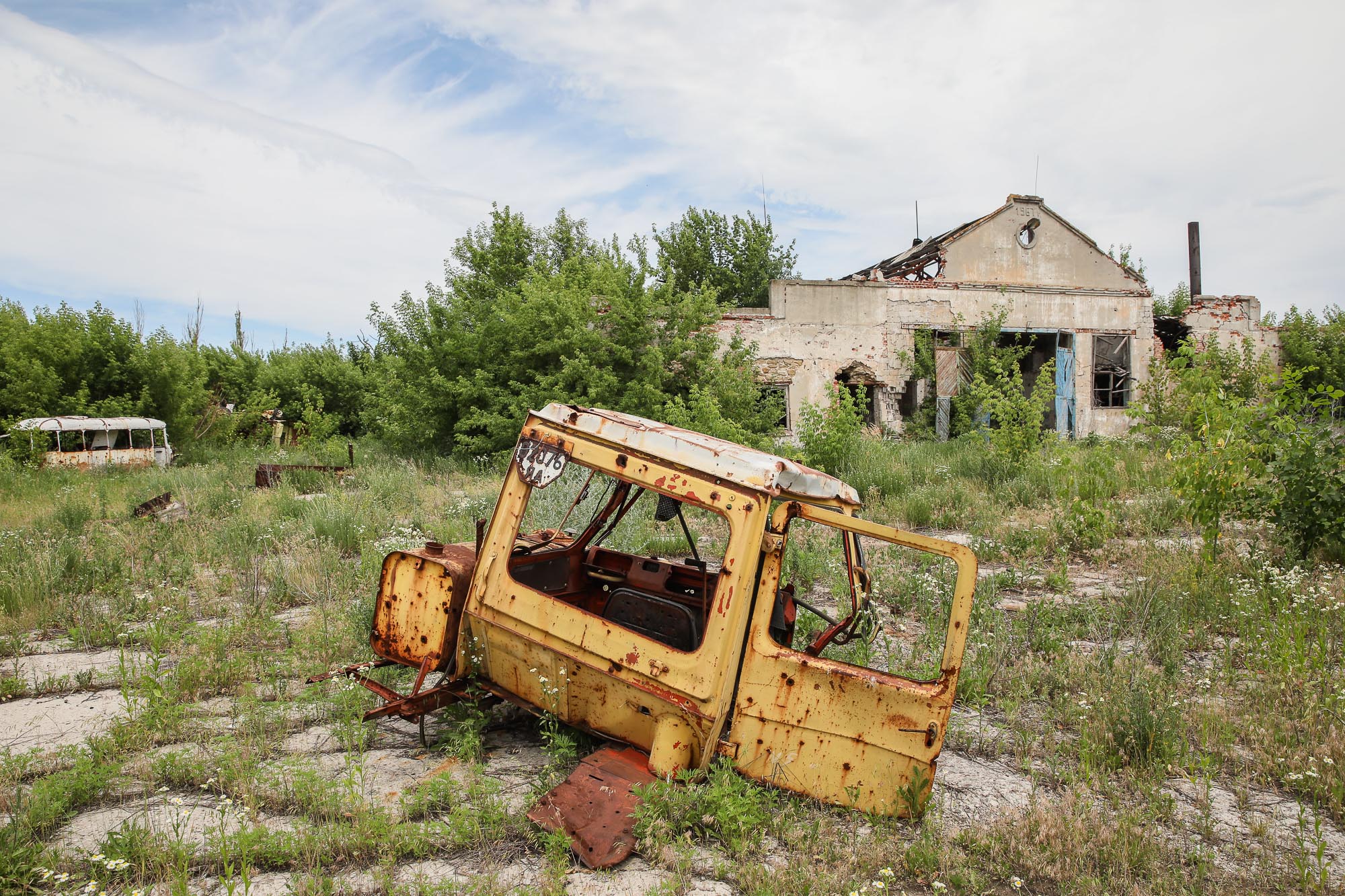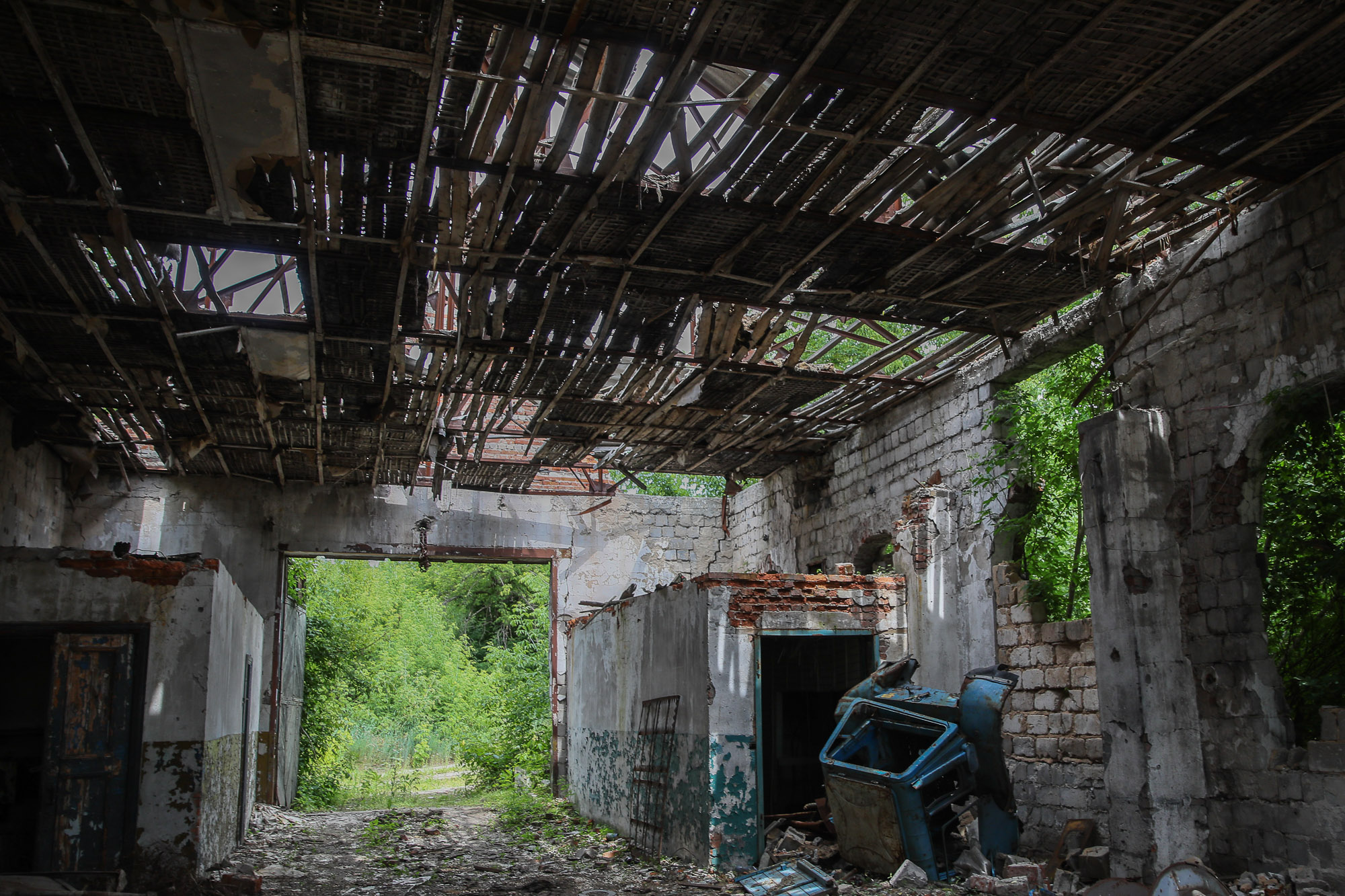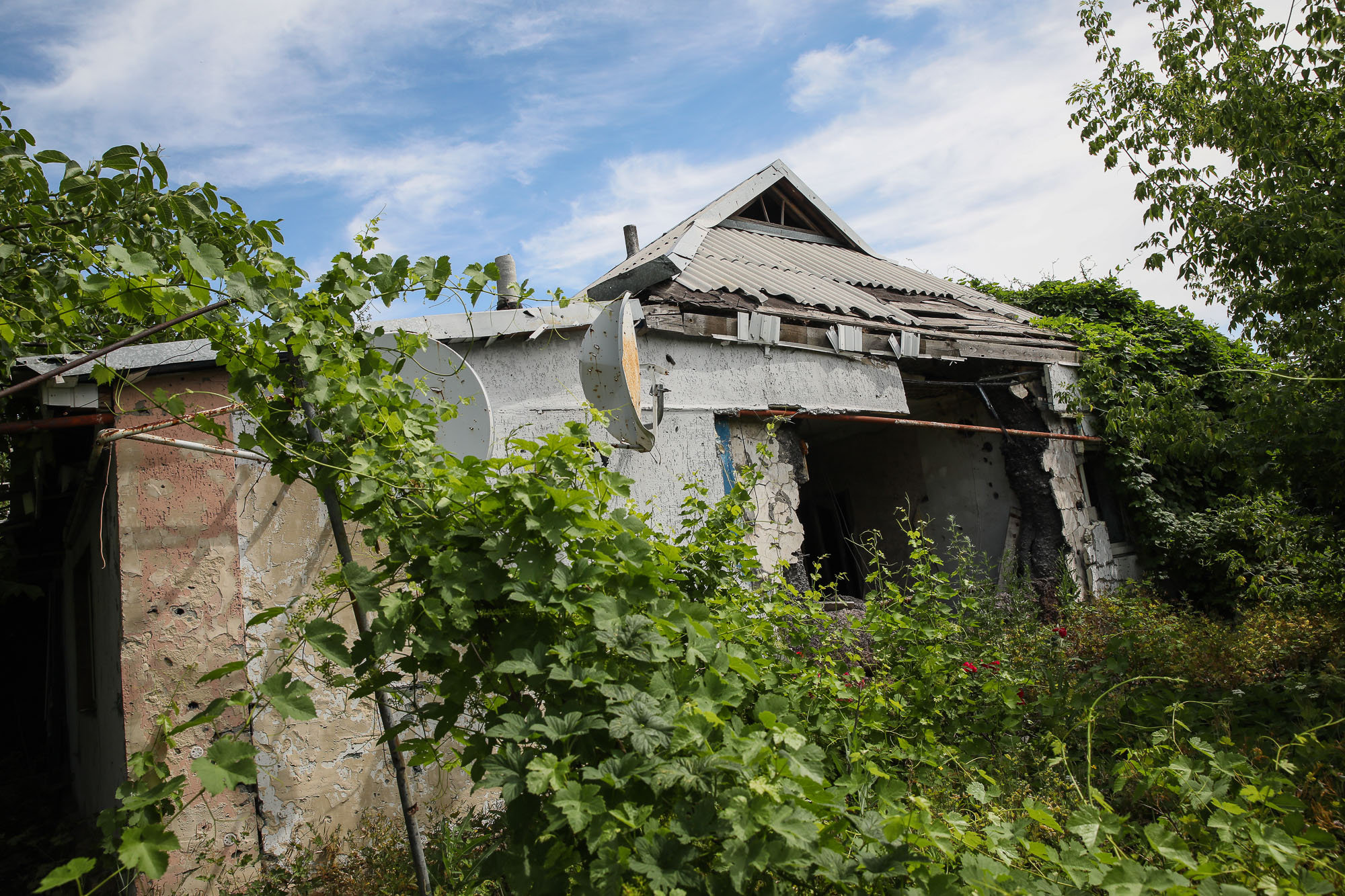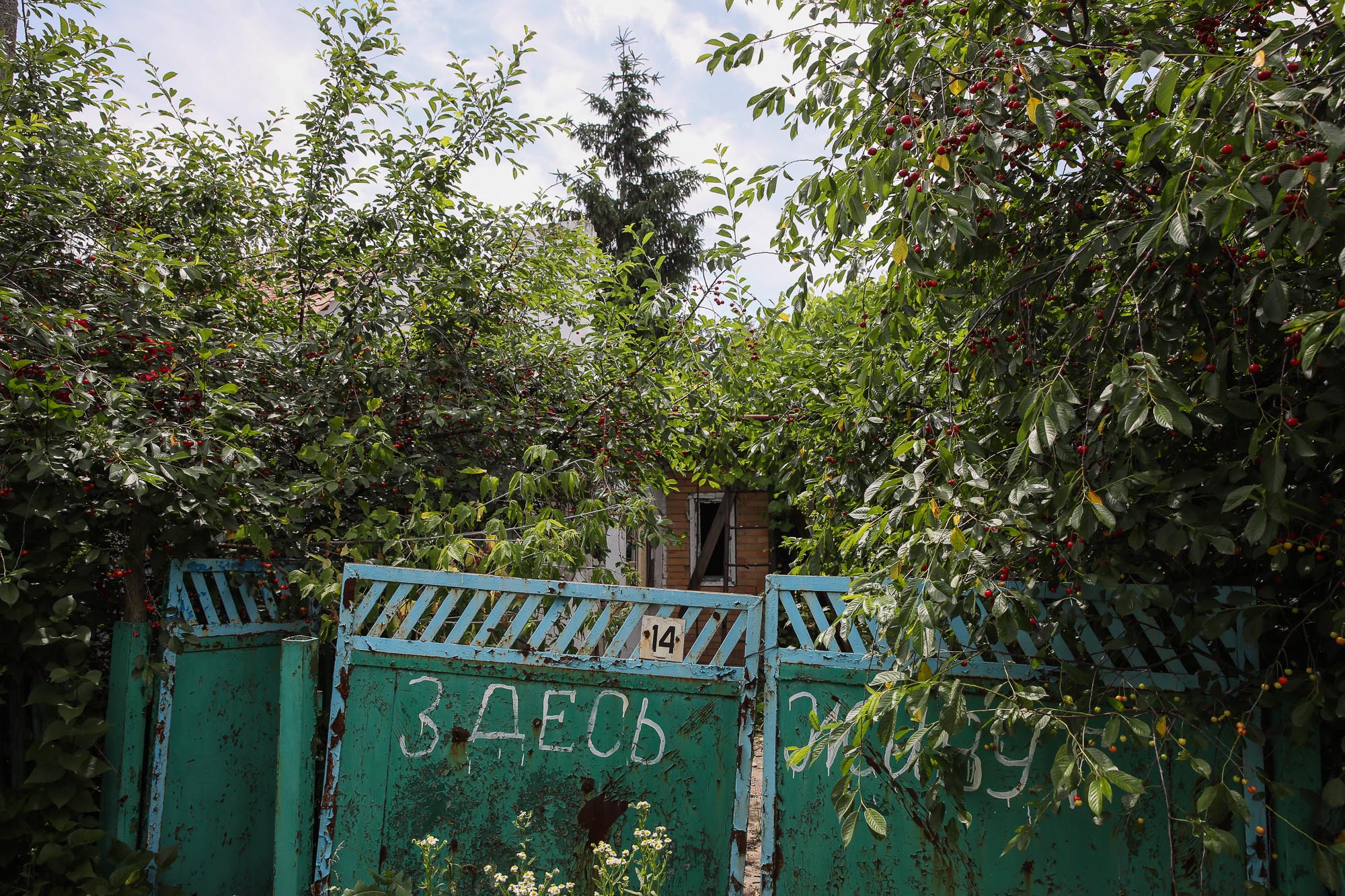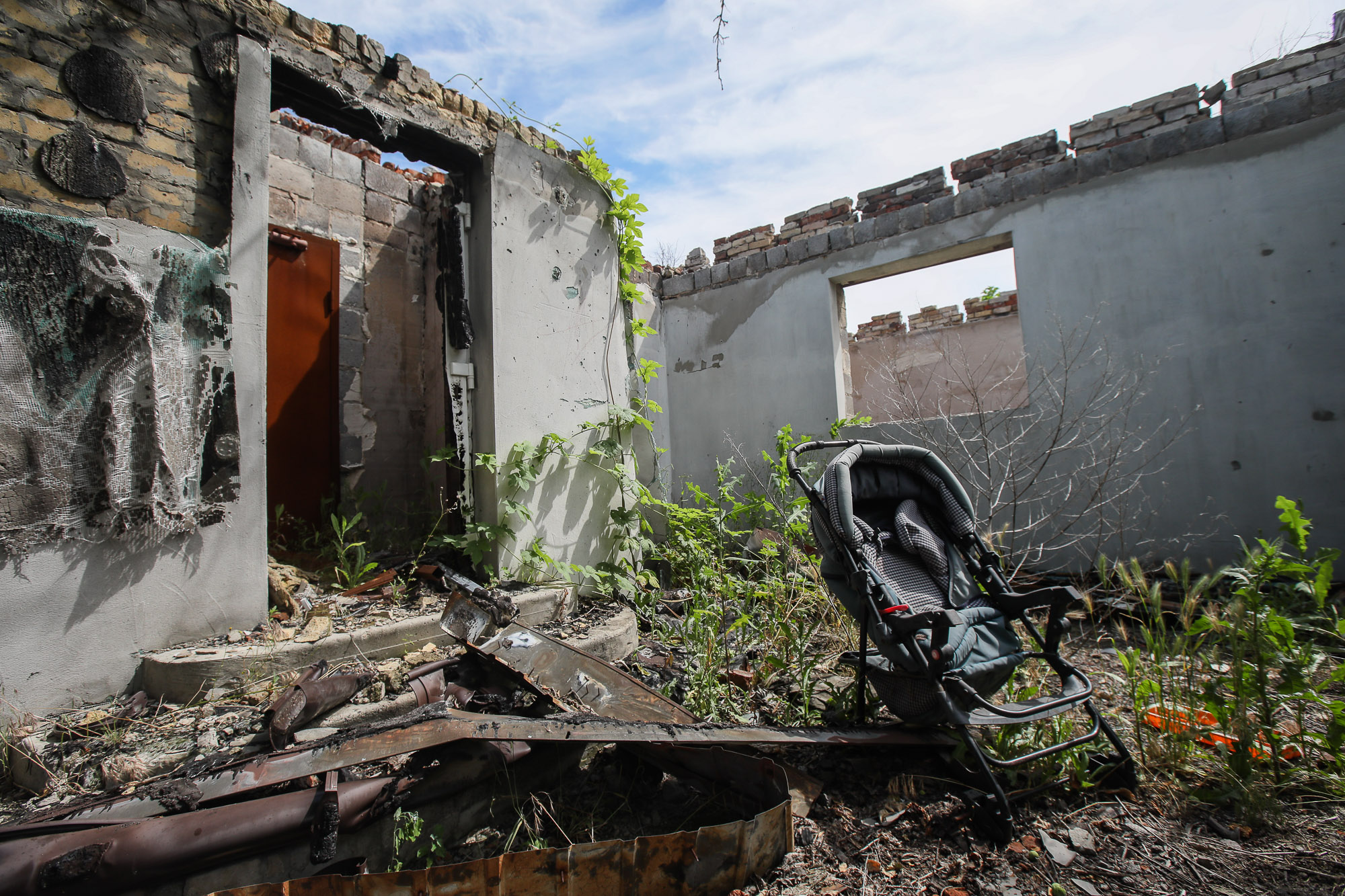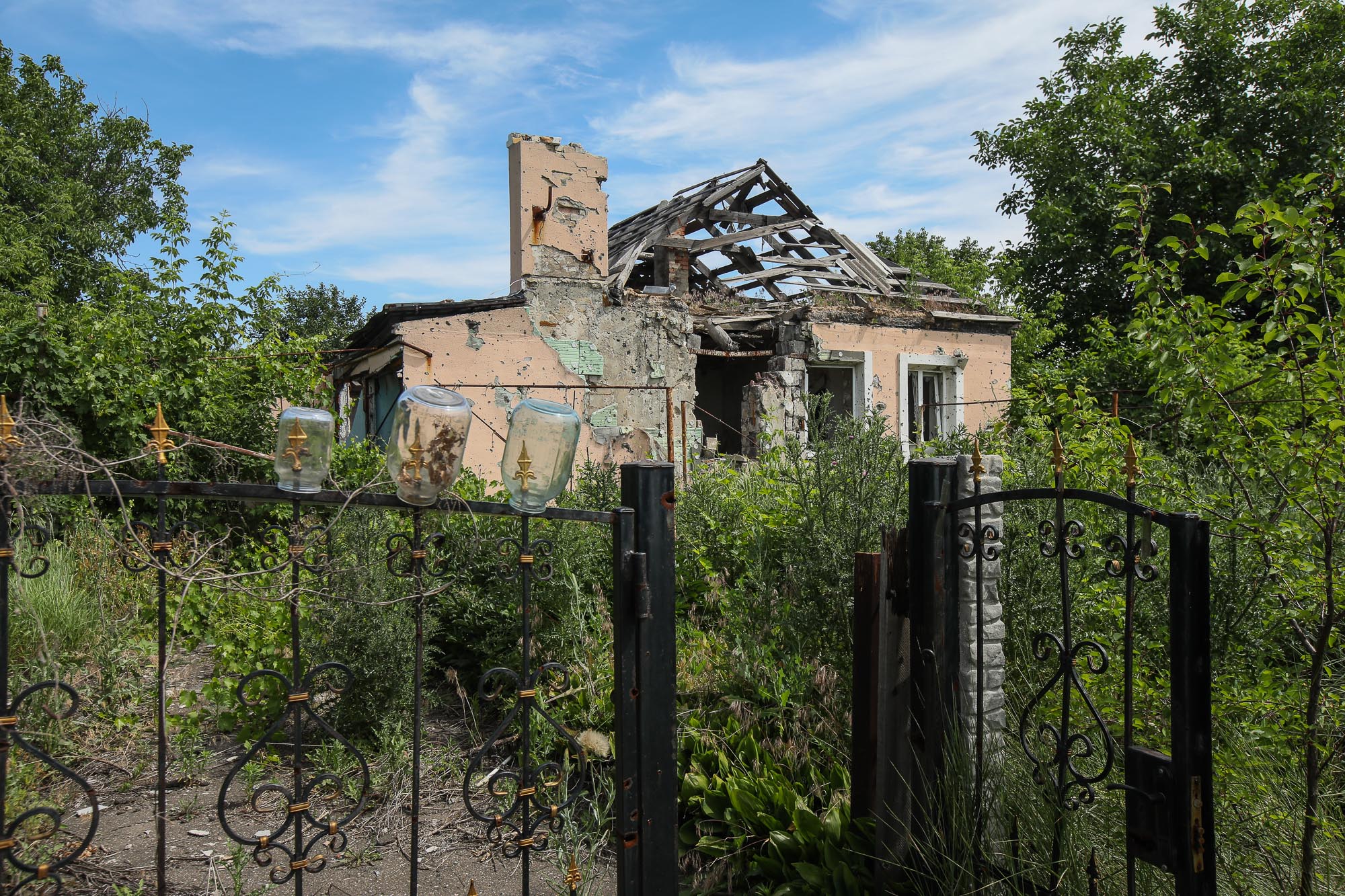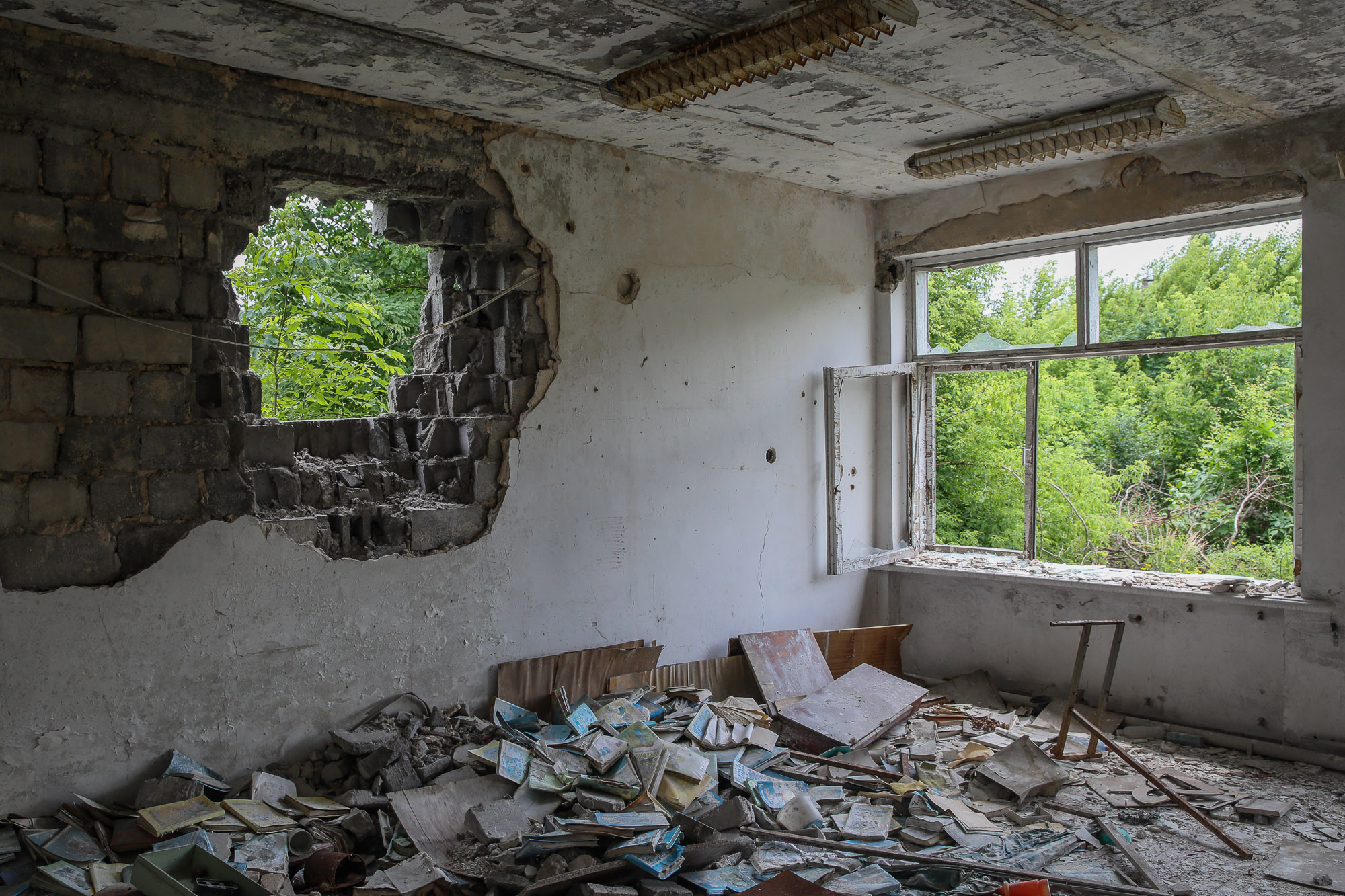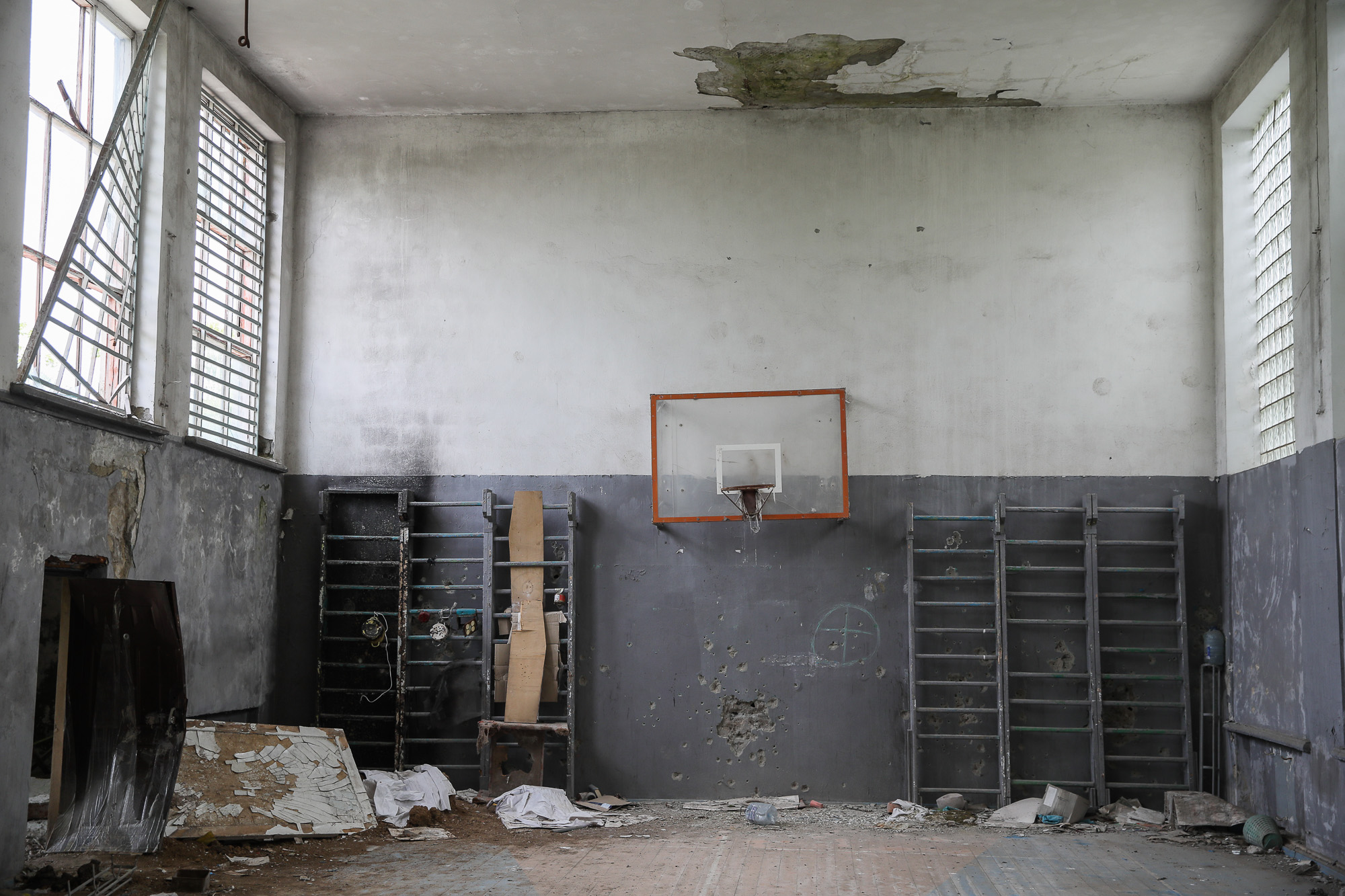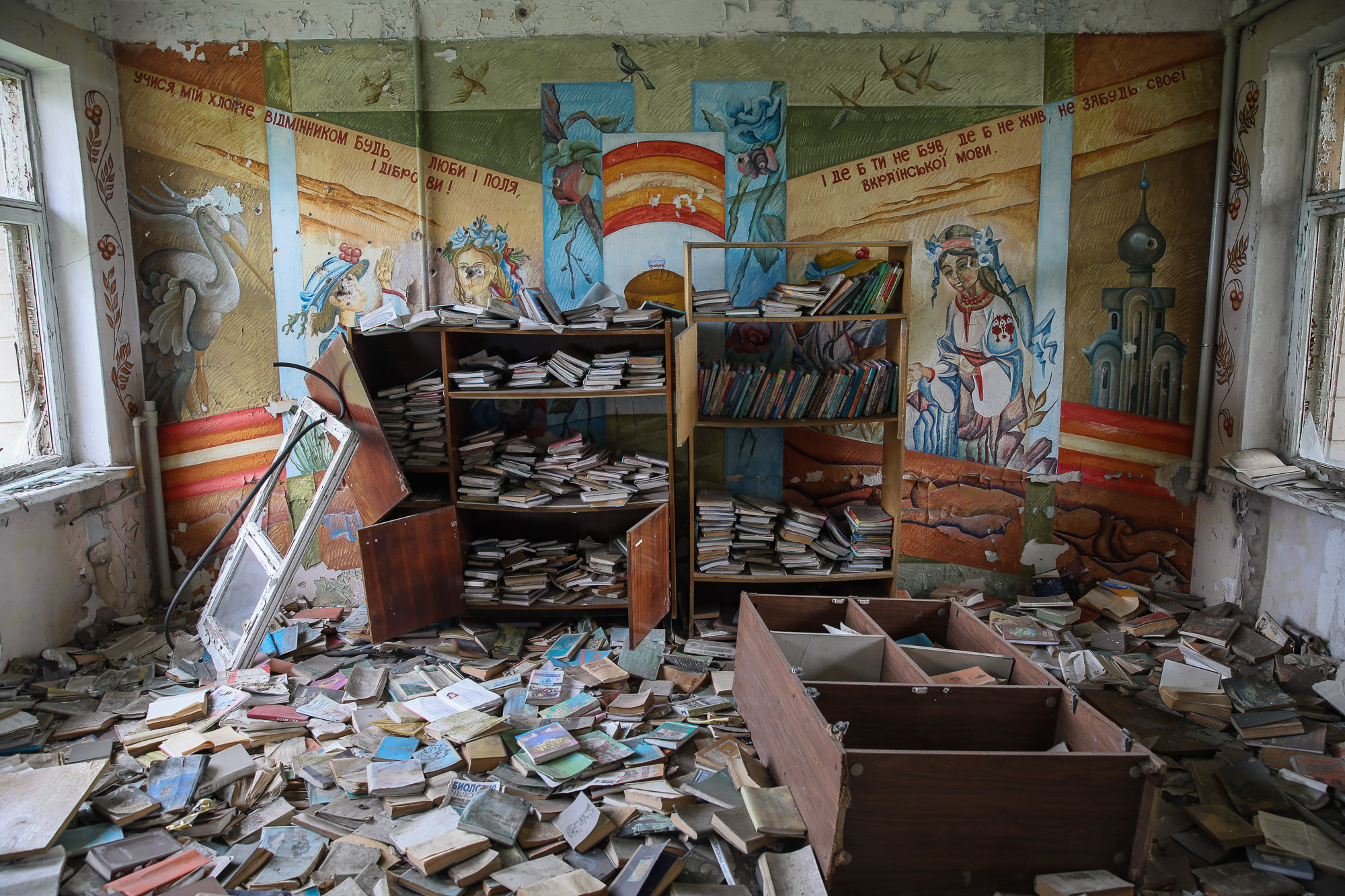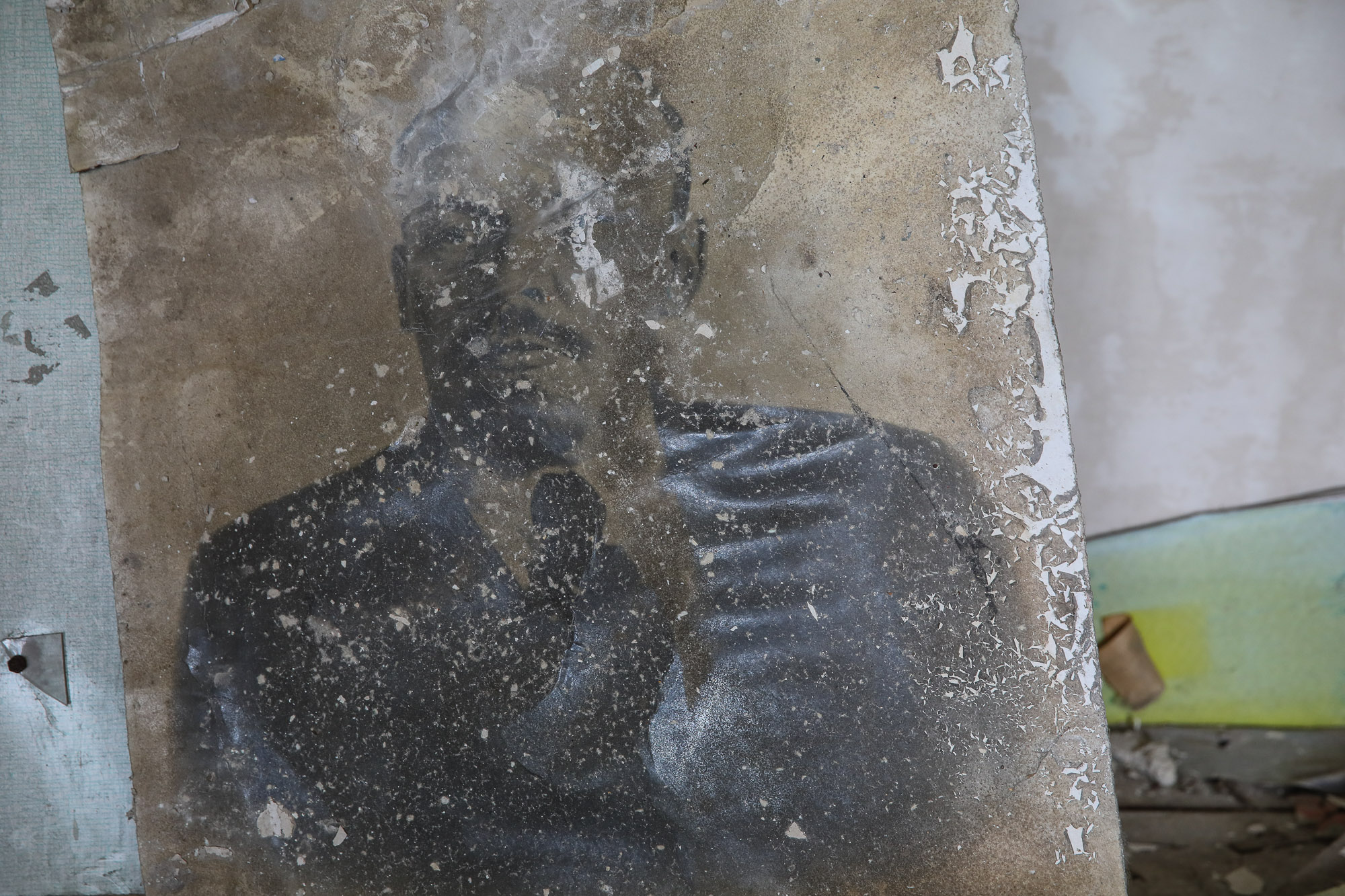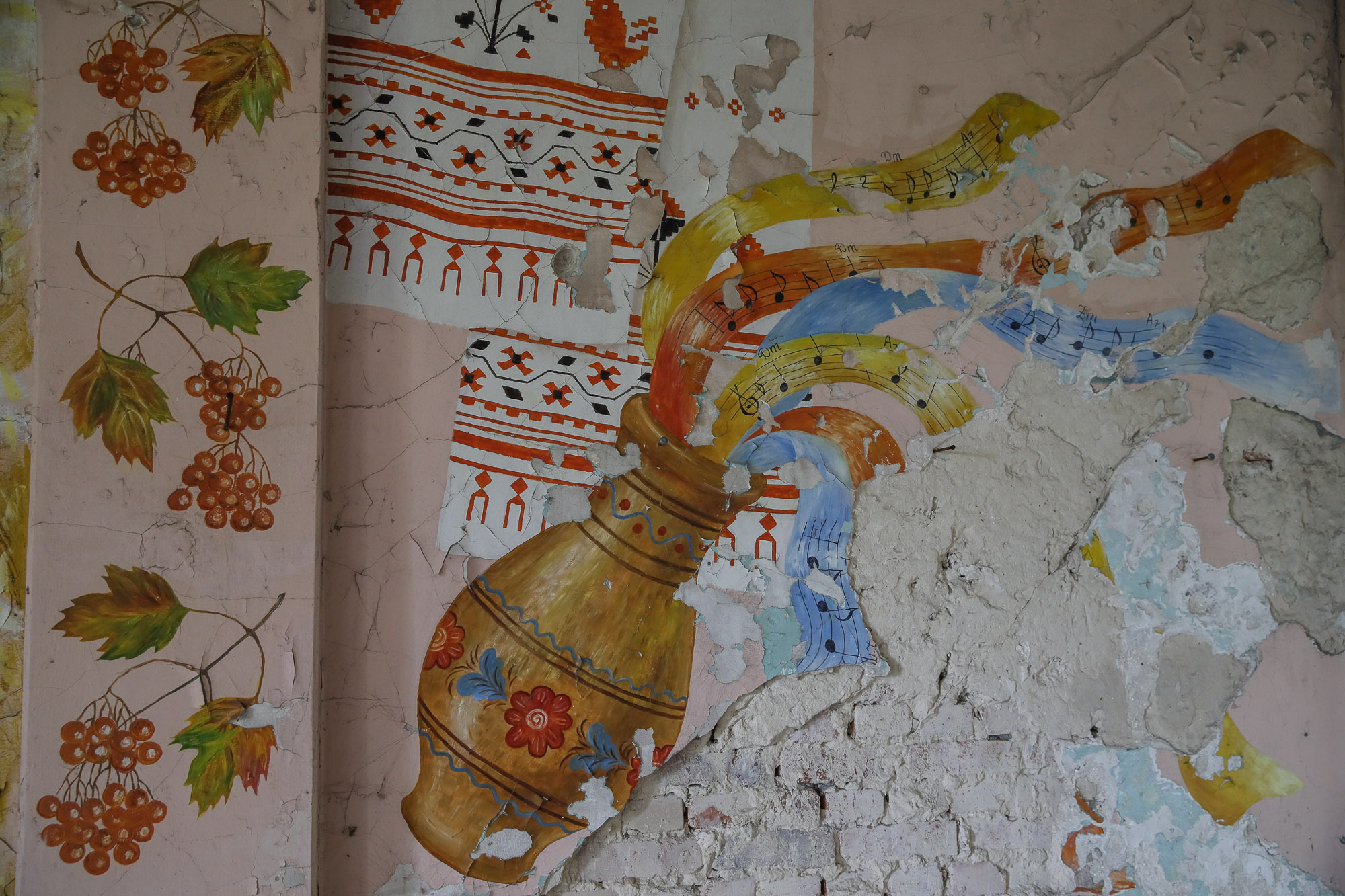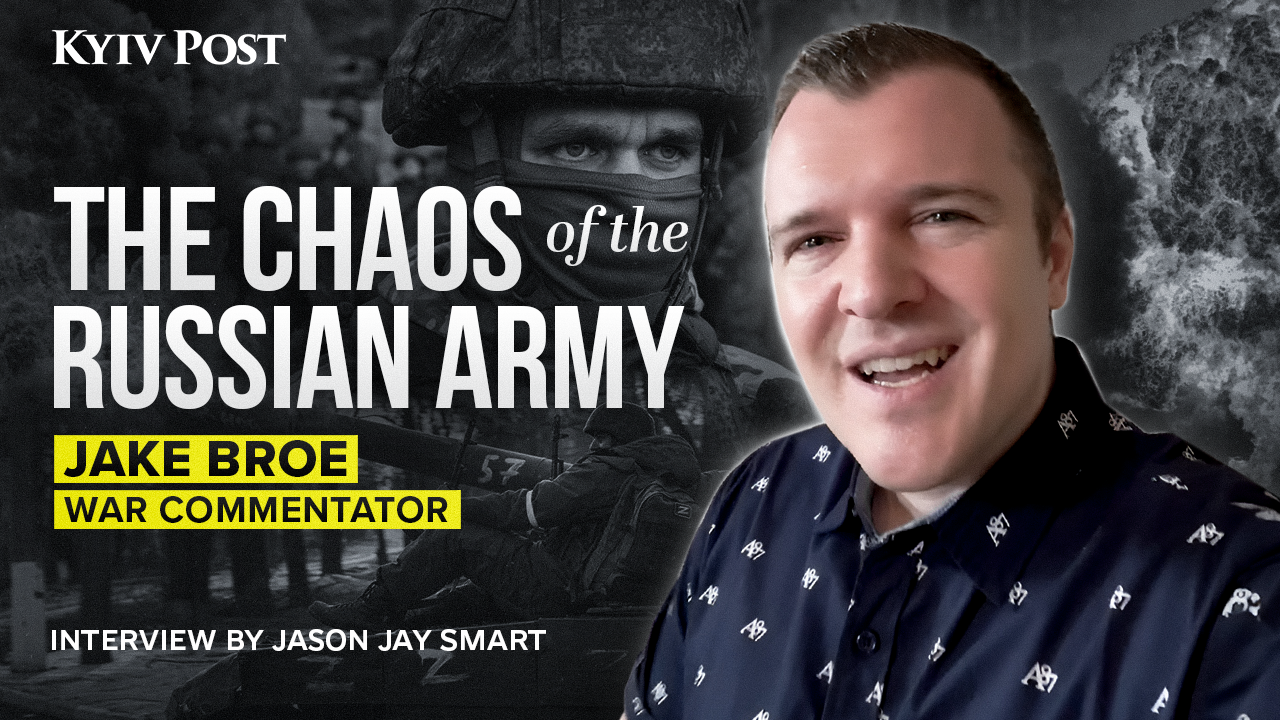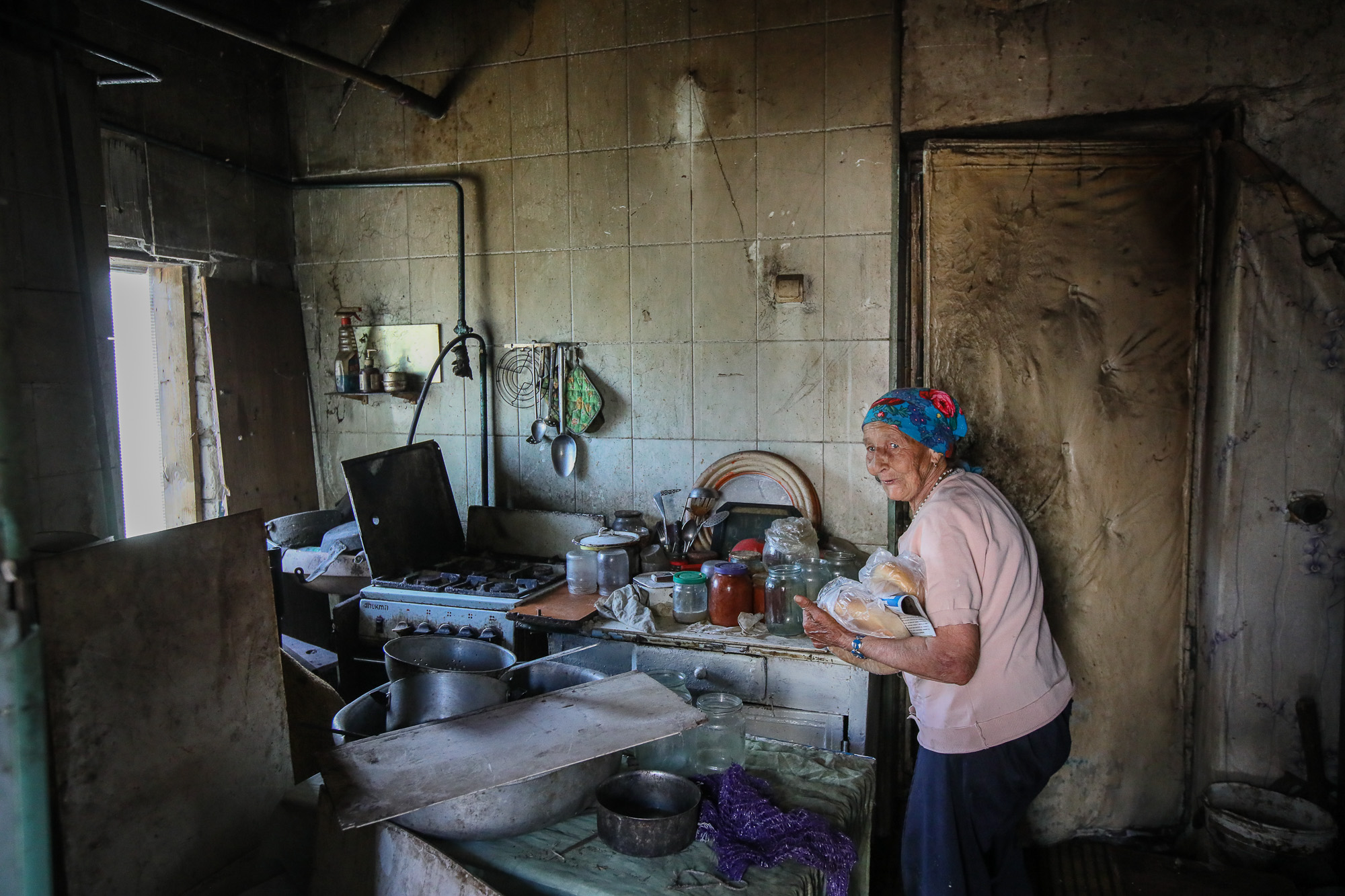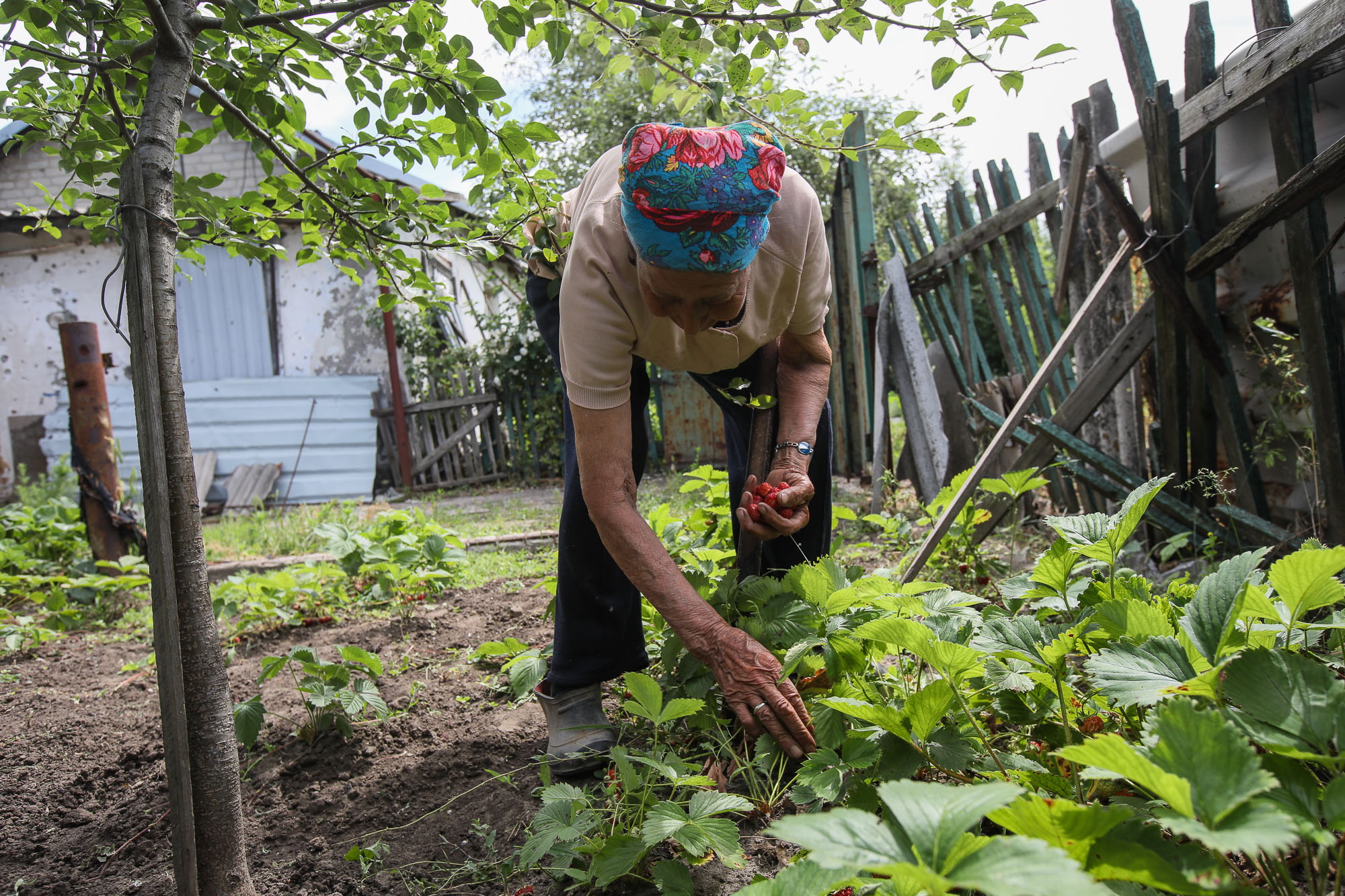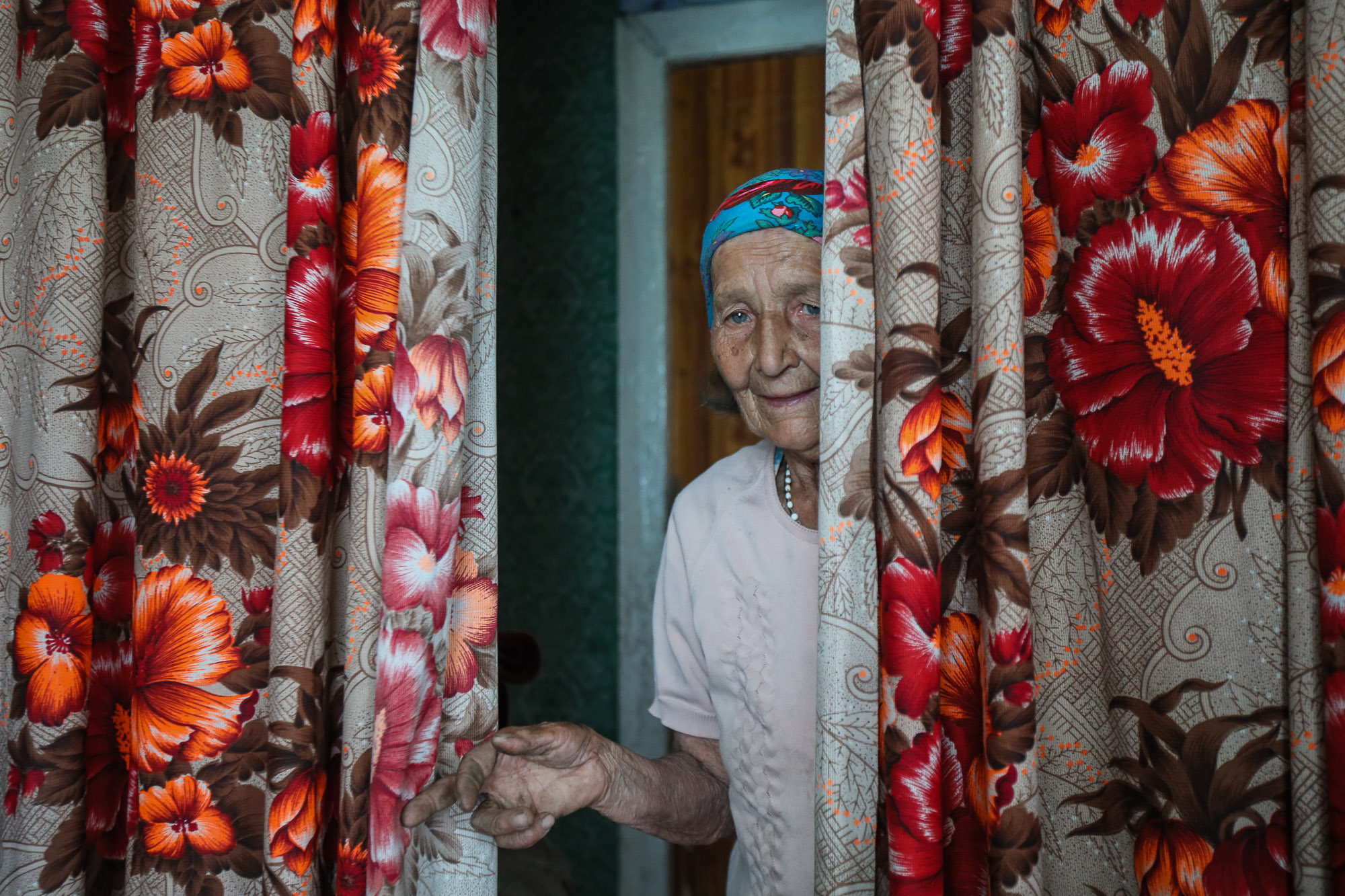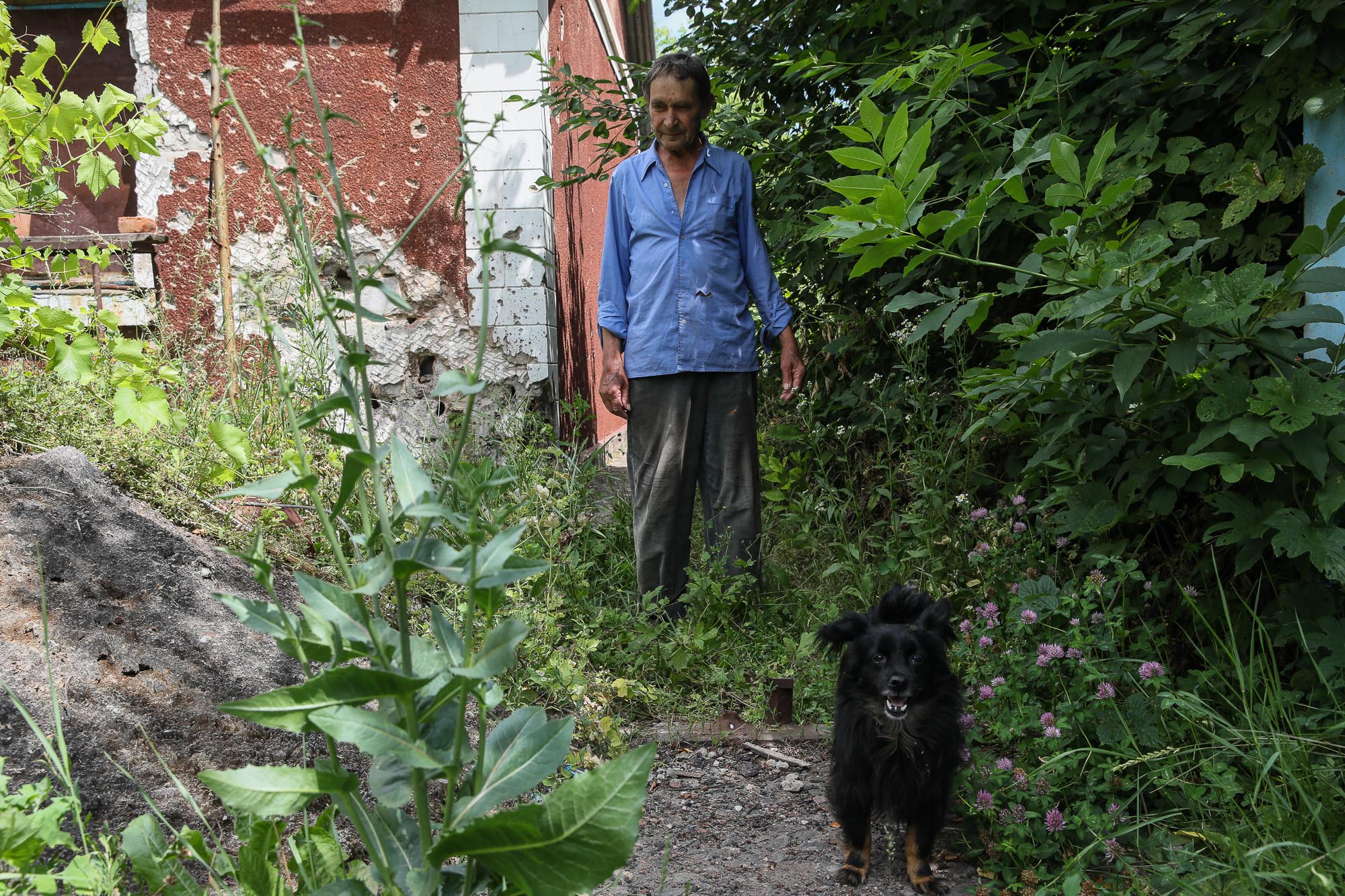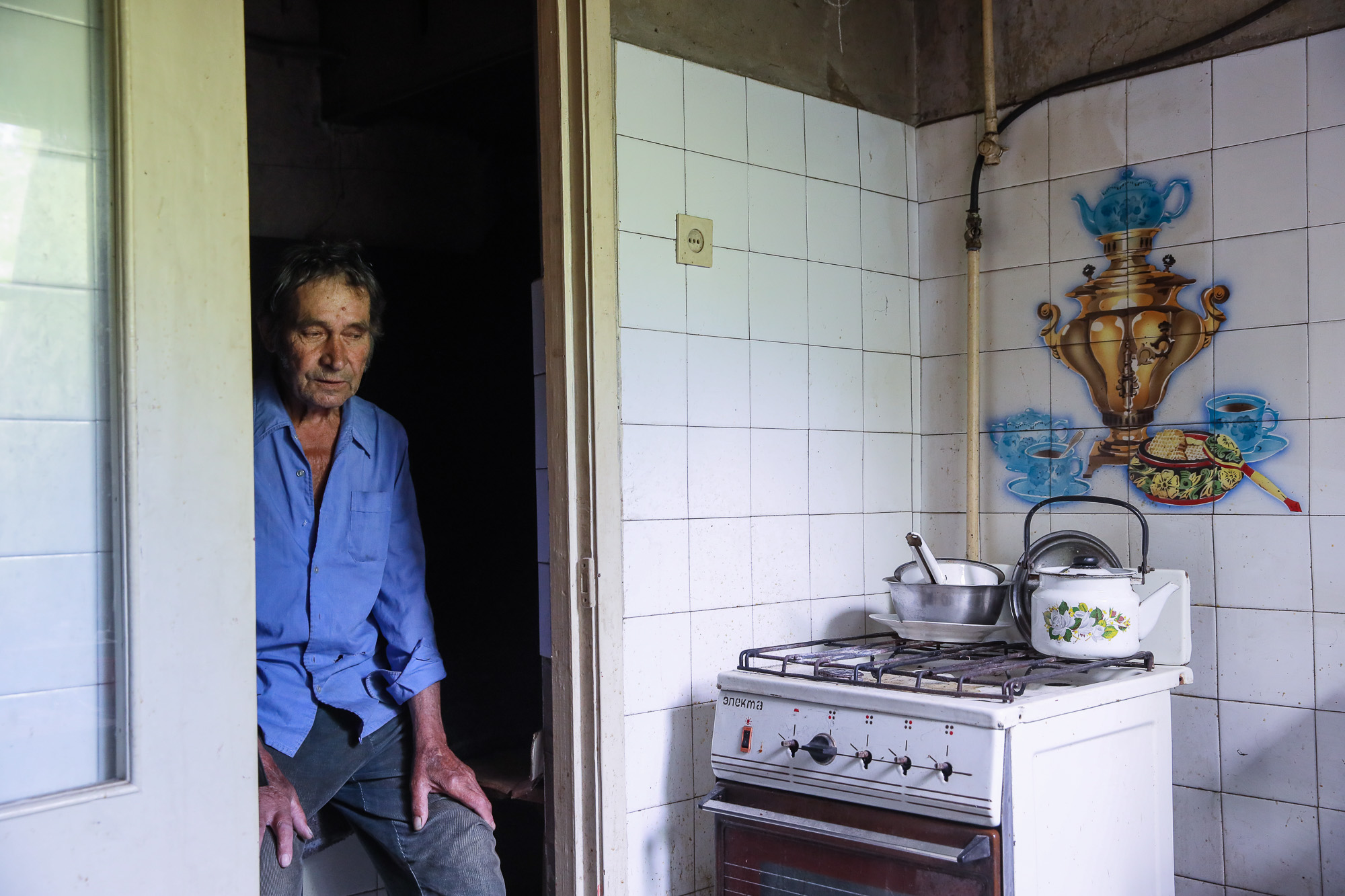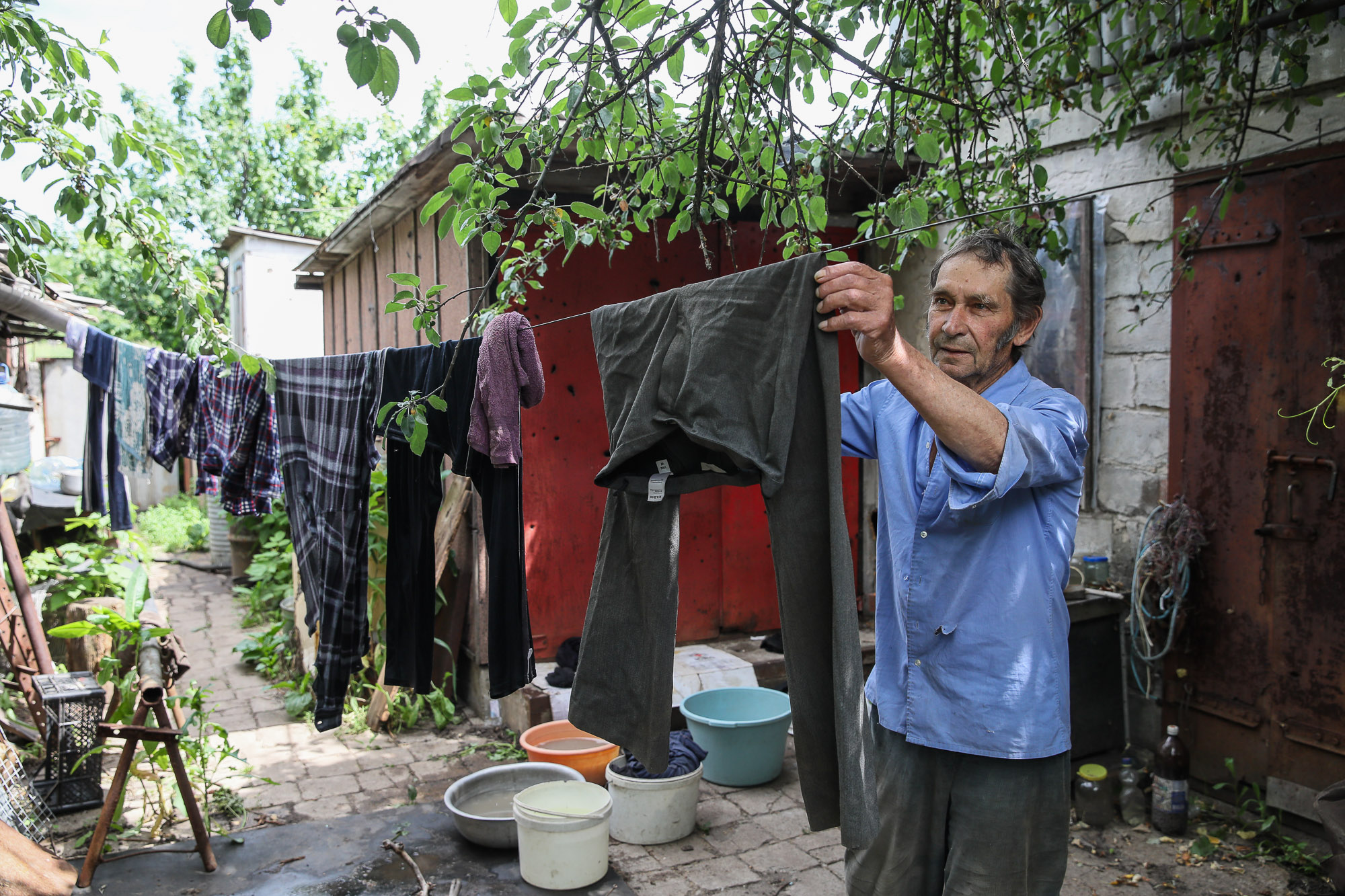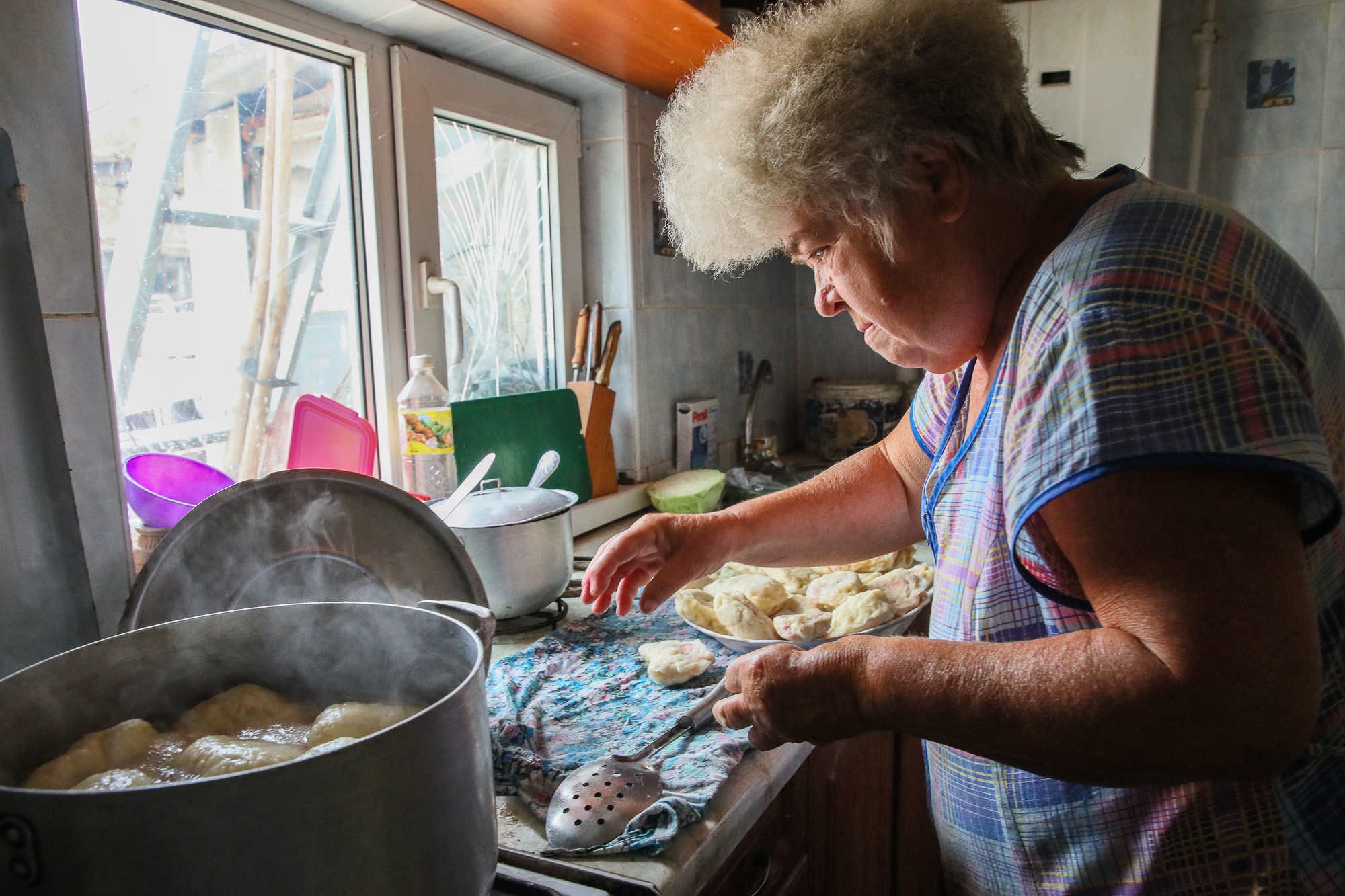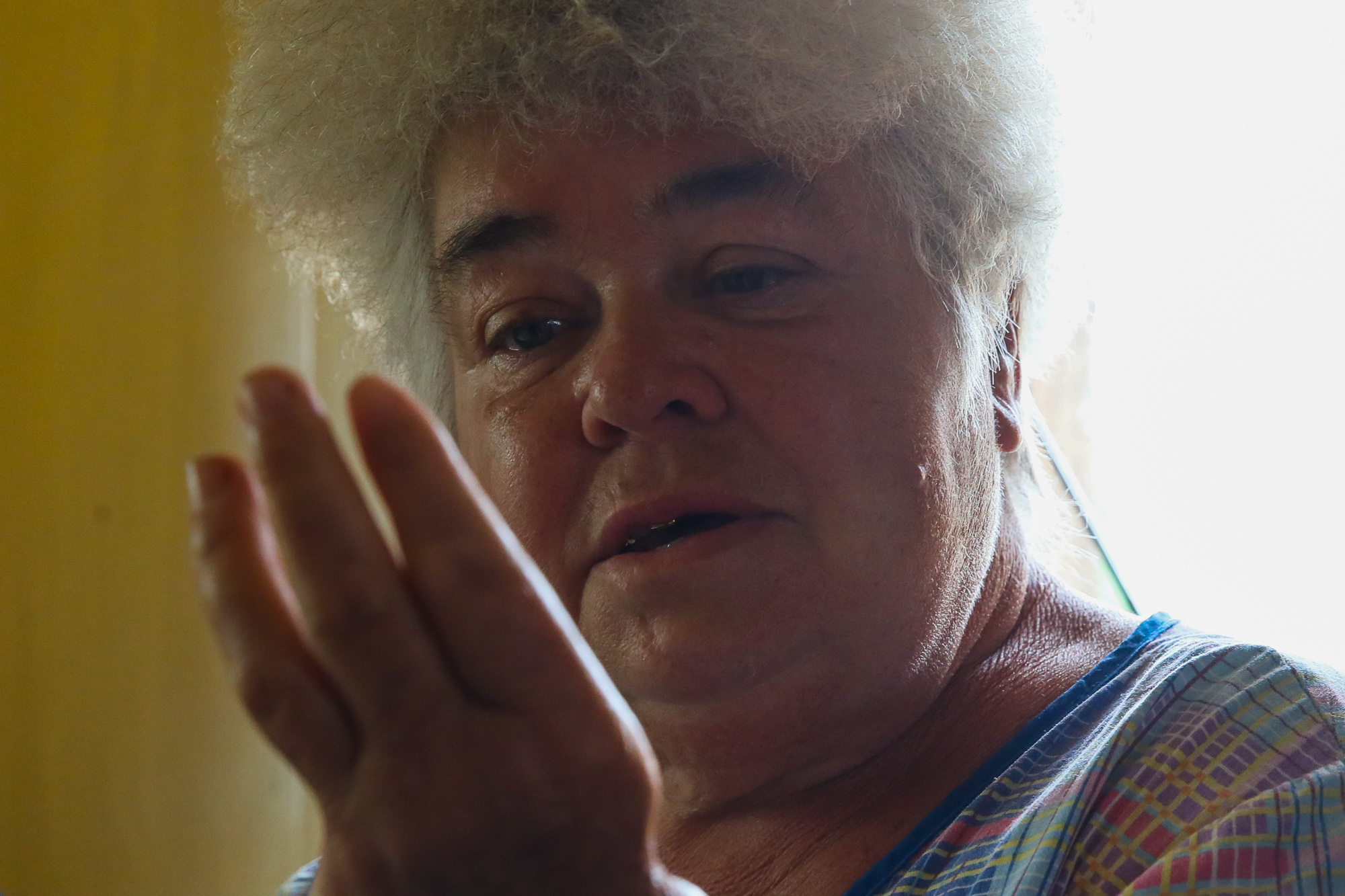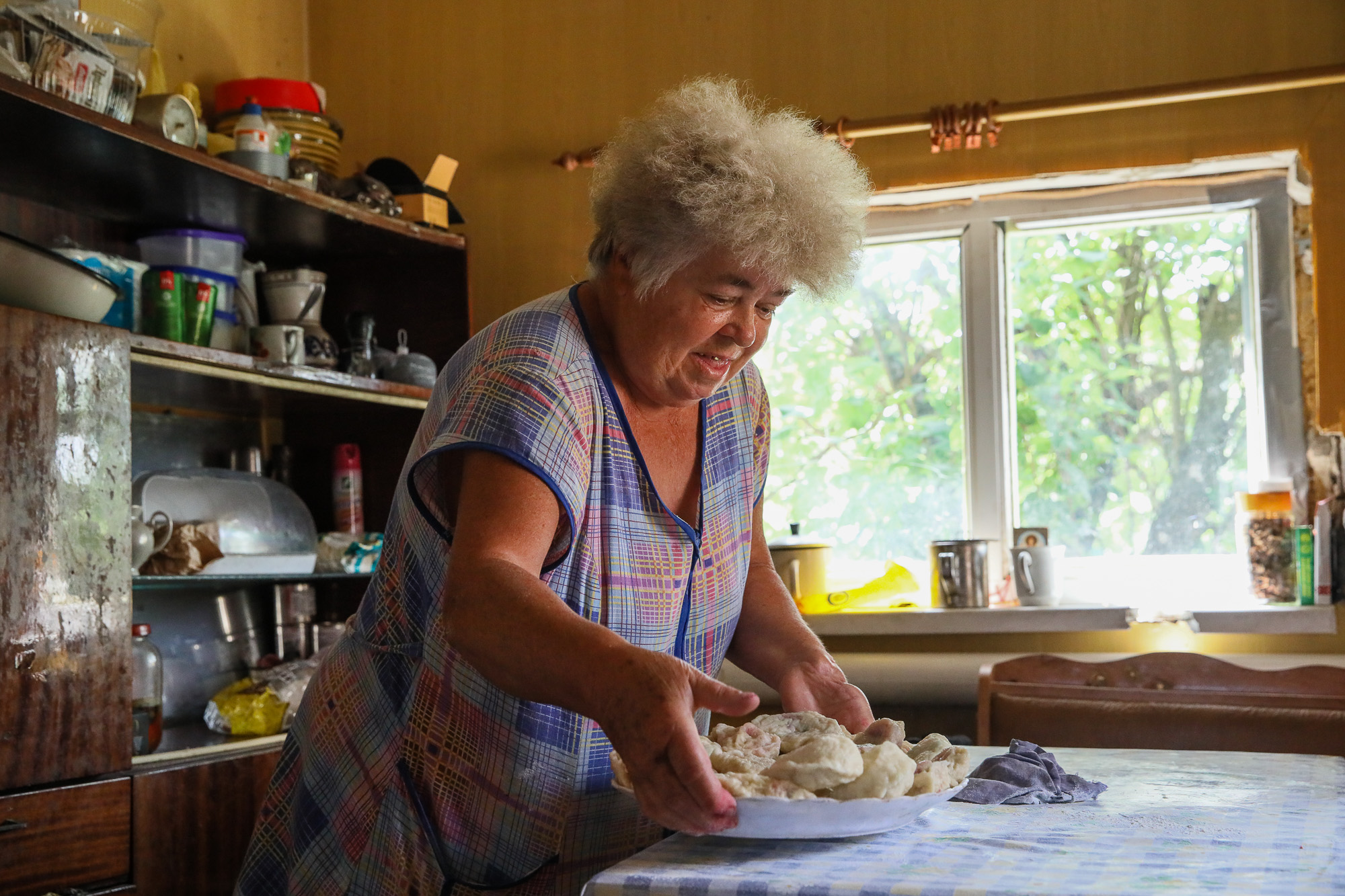OPYTNE, Ukraine — Rodion Lebedev, a stout man in his 40s with glasses, makes his way down a path of cracked asphalt running through dense brushwood.
His instincts from living in a war zone make him watch every step he takes in this desolate place — something deadly, such as yet another unexploded munition, may be waiting beneath the tall grass.
JOIN US ON TELEGRAM
Follow our coverage of the war on the @Kyivpost_official.
Lebedev passes by the ruins of abandoned houses and frayed fences riddled with shrapnel from Grad missiles. He carefully steps over piles of broken glass scattered next to splinters of roofing, broken bricks, and window frames swept off houses by artillery shelling.
This used to be a cozy lane of suburban cottages whose yards blossomed with fruit trees and flowerbeds. Today, it is a grim scene of decay and desolation that is rapidly being reabsorbed by the wilderness.
Here in this Donbas frontline town of Opytne, some 580 kilometers southeast of Kyiv, fantasies of post-apocalyptic fiction came true.
Before the war, the town was home to 850 people. Now only 38 remain in the few barely standing houses.
Since Russia invaded Ukraine in 2014, those who remain are often dodging the fighting from both sides.
The townspeople have been cut off from all basic amenities of civilization, effectively becoming a strange reservation where the last few residents of this obliterated war zone live amid scenes of societal collapse, lawlessness and the total breakdown of public utilities.
But even in this grim dystopia, there is still a place for human kindness and altruism. As Lebedev walks through the decaying streets of his hometown, he carries a bag full of bread loaves — simple, helpful aid for the lonely elderly people trapped in desperate poverty here.
Across the minefield
One cannot simply drive into Opytne — the military defending the area upholds a strict pass control, even for civilians.
But there’s another way beyond the military checkpoints, used mostly by locals: several kilometers of dirt roads running through dense anti-tank minefields just south of the fortress city of Avdiyivka. It looks like a rather busy lane — back and forth, locals ride their bicycles along the paths, passing by red skull-and-crossbones signs warning of the landmine threat.
On the way, travelers can sometimes notice a giant gray silhouette on the horizon: the ruins of the Donetsk Airport, which Ukrainian forces heroically defended for 242 days in 2014-2015. Its airstrip lies less than 2 kilometers south of Opytne.
As the path leads deeper into the warzone desolation, dense foliage eventually merges with the ruins of Opytne’s scorched one-story cottages.
The town is dead silent; it seems that even the birds have stopped singing.
Some of the war’s heaviest battles have already roared through here, effectively wiping this town off the face of the map. Not a single structure was left untouched. All of Opytne’s buildings have been left either uninhabitable or heavily damaged.
With few people around, nature quickly reclaims what is hers. Vegetation overwhelms the destroyed homes. Bushes spring up from the floors of destroyed houses, their branches stretching through the blown-out windows.
Many locals had to leave their homes in a hurry under heavy barrages of artillery fire. The remnants of their belongings — dirty books, decayed clothing, toys, broken baby trolleys — are still scattered across their scorched yards.
Other were trying to hold onto their homes. Many of the rusty fences still bear the spray-painted phrase “People live here,” left in hopes of convincing the military not use the area as an artillery firing spot.
Nonetheless, even those few islets of civilian life on the battlefield were eventually abandoned and surrendered to the chaos of destruction.
No authorities
In this desolation, time stands still.
“Life here was thrown by several centuries back,” says Lebedev as he walks on.
“It’s as if we’re living in a post-apocalyptic novel. We’ve been cut off electricity and all water supplies since the early months of the war — for 5 years already… Not a single ambulance has ever visited Opytne in all these years. The easiest way to get back to civilization is to make it to Avdiyivka across the minefield.”
Before the war, Lebedev was a local district council member. But, unlike many other neighbors, he decided to stay in the town he used to represent and take care of those who had nowhere else to go to escape the war: mostly, lone elderly people. His own two-story house on Friendship Street was mutilated by Russian Grad missiles — another example of the grim symbolism one meets at every turn in Donbas.
Lebedev is basically the last relic of any centralized authority here: All local governance disappeared from Opytne after the war began. Opytne used to be part of an aggregated community centered in the town of Spartak a few kilometers east, currently occupied by Russia. Once Russia occupied the seat of the town council, local authority was never reinstated in Opytne and a number of other frontline towns.
“Since 2015, I’ve been trying to persuade the oblast governor to launch a civilian-military administration here,” Lebedev says.
“Or at least to unite us with some other administration, such as the one in Avdiyivka. But with no success at all. We’re trapped in an endless limbo — for instance, we can’t submit reports on civilian infrastructure damage and receive aid from the government, because such reports must be certified by a local authority board. But we don’t have one!”
“Their position remains unchanged for years. For them, it’s easier to have this zone completely depopulated rather that looked after.”
‘Shoot me too’
Among the lanes of decaying ruins, some houses appear to be severely damaged, but clearly maintained and repaired. Someone is still living there.
Lebedev opens the gate at one of relatively intact house riddled with bullet holes.
He is welcomed by Anna Horpynych, a 78-year-old woman living alone here. She gets by on her miniscule pension, delivered by Lebedev from Avdiyivka, and vegetables she grows in a small garden in her backyard. The first several loaves of bread Lebedev delivers today go to her.
As always, she is busy digging in the soil. But she is also willing to treat her sudden guests to fresh strawberries.
“See those new bullet holes in that wall I recently refurbished?” she tells Lebedev.
“A while ago, a soldier was hanging around my house. The fool probably had nothing else to do, so he started popping off rounds into my wall with his rifle. I leaped out and started screaming at him: ‘What are you doing? Come on, shoot me too if it’s so fun.’ He went pale and said: ‘Oh gosh, I never knew somebody was living in this mess!’”
“As an apology, he brought me foods for some time after. Awfully nice of him,” she laughs.
Having bid good-bye to the old woman, Lebedev walks further.
“In 2015, her only son Viktor was killed by a shell fragment that hit his head,” he says. “There was no way we could leave the town amid heavy fighting. So I had to simply bury the guy in an impact crater in his own backyard back there. Only a year later, we received money from charities and exhumed the body to rebury him in a decent way at a cemetery.”
In the dark
Down the green lane lives another lone elderly person. His name is Oleksandr Suprun, and he is also 78 years old.
When Lebedev arrives, he is doing the laundry.
“It’s great that you came,” he says after receiving his bread. “I now communicate mostly with my dogs. My strength is barely enough to work in the garden for a living, let alone visit neighbors.”
Suprun is lucky. His house is more or less intact. Even though fighting now rarely erupts in the area, he still sleeps on a makeshift bed placed in a dark storage closet protected by thick walls — hardly good protection from shelling, but still better than nothing.
But this life has already taken its toll on Suprun: his eyesight quickly started to deteriorate from countless days spend in the dark shelter during the fighting.
A while ago, Lebedev managed to find charity money and pay for lens surgery for Suprun, but only for one eye. The second one eventually went blind.
The old man warns his visitors to watch out for mouse traps on the house’s floor.
“Stray dogs have killed all the cats in the town,” he explains, “so mice and rats breed in great numbers here, and they even stopped being afraid of humans… There were days when I managed to trap over 50 mice. That’s how we live here.”
War-weary
Suprun’s distant neighbors, the Honcharov family, consider themselves lucky by local standards — even though their garden bears at least 16 impact holes, including some with unexploded ordnance.
They even possess one of the full-fledged treasures of this town: a solar panel provided by the International Committee of the Red Cross. While the town has been in blackout for the past 5 years, this cell helps charge mobile phones for many of Opytne’s last residents and can even turn on a kitchen light bulb for several minutes.
Like everyone here, the Goncharovs are afraid of the dark, when the roar of artillery shelling erupts from all around Opytne. And for the last 5 years, Anna Honcharova and her husband Mykhailo have spent their nights in a basement warmed by a makeshift oven.
But that’s the night. And while the sun is still shining, she treats her visitors to cherry dumplings cooked on a fire fueled by a gas tank. The welcoming homemaker is missing two fingers — back on September 7, 2014, her right hand was severely injured during a Grad missile attack on the town.
No matter how difficult it is, the Goncharovs try to maintain a normal life and keep their household in order.
Sometimes, this leads to tragic-comic occasions they can’t resist recounting with a smile.
“A while ago, we decided to clean away the mess in our backyard,” Anna says.
“You know, abandoned gardens here turn into real wilderness. So we cut excess dry branches off our trees and threw all this stuff to an impact hole next door. We set it on fire and were watching it burn like loonies. And then it suddenly started booming and cracking like hell — we barely got away in time. And my husband got his cheek slightly cut by a fragment.”
“And last year Mykhailo was harvesting pumpkins and set some dry weeds on fire. And here we go again: Bullets from the blaze started flying all across our backyard.”
But poverty and daily hardships cannot compare to the continued low-grade fighting that often erupts near the few remaining inhabited homes in Opytne. Even today, these decaying streets are no strangers to self-propelled howitzers, armored vehicles, and anti-aircraft guns striking the enemy lines.
“When they all fire from here, our house literally jumps up,” Honcharova says. “We can withstand many things after these 5 years, but not more fighting. We’re all simply too tired of this war.”
You can also highlight the text and press Ctrl + Enter


